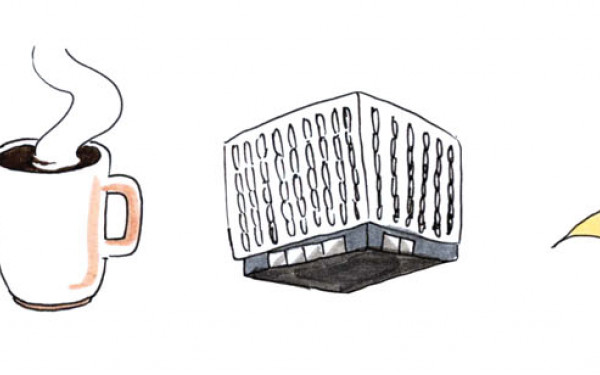Editorial: Say “Yes” To a Brighter Food Future
After spending some time at Concordia, you get used to being unsatisfied with the food options on campus, veering out of the immediate “Quartier Concordia” surroundings to find something fresher and more affordable elsewhere.
It’s easy to just roll with the punches and say nothing will ever change. But we have the chance to help shape the future of food at Concordia.
Two referendum questions are being put to undergrads that could have a significant impact on who will get food contracts in the near future. With Java U’s contract with the Concordia Student Union’s for-profit wing expiring next semester, and Concordia’s contract with cafeteria food provider Chartwells up for negotiation in 2015, there’s a real chance that these changes could be seen while some of us are still in school.
One of these questions could give the CSU a direct mandate to use the space in the Hall Building leased by Java U to launch a new student-run co-operative café or restaurant in its place.
None of us can say we’re satisfied with the Hall Building Java U. It offers the same food options as the Java U at the corner of Guy St. and de Maisonneuve Blvd.—but with higher prices.
Having a student-led co-operative take over the space doesn’t necessarily mean that the CSU won’t be able to turn a profit, but it certainly does mean that students won’t be gouged each time they want a cup of coffee in the morning.
And considering how early Java U closes, student-owned space could be used far more efficiently.
Café X in the VA and EV buildings is a perfect example of how a student-run café can meet student needs, and we’re excited about the possibility of the Hall Building having something similar in a space far more Concordia students pass by every day.
However, we have reservations about flat-out encouraging students to vote in favour of the Concordia Food Coalition’s fee levy of eight cents per course credit.
The CFC’s goal of bringing more sustainable and student-run food options to campus is a commendable one, but we’re just not sure where exactly all the money collected from the fee levy would go.
At the moment, the CFC’s primary role is to spark a discussion on how to improve the university’s food system, conducting research into alternative student-focused food services at other universities and making suggestions as to how Concordia’s food system can be made more affordable and environmentally friendly.
The CFC succeeded in creating that dialogue, holding workshops to spread information and better inform students about food politics. But it’s still far from clear specifically what the funding from a fee levy would be put towards.
The CFC also has other projects, including an ambitious plan to secure local farmland for the production of organic food for the Concordia community. But many of these projects are only in their initial planning stages—thus leaving budgeting up in the air.
Despite our reservations, we feel students need a permanent body that can get involved in university food matters.
Universities should be at the forefront of the movement towards local food production with a lighter ecological footprint.
For the university to see that these are important issues for students, these initiatives need a “yes” from the student body. We’re the ones eating this stuff—especially in the case of students living in residence, who are forced to pay through the nose for meal plans.
We’re the biggest stakeholders in Concordia’s food system, so let’s lead the charge for better food options on campus instead of waiting for Concordia to decide when it’s time.
A “yes” for these two questions is a step in that direction.





